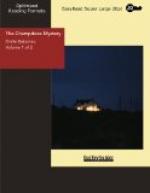and thought fondly of his shyness and diffidence when
he hardly ventured to raise his eyes to hers.
Octave, however, fell a victim at the first glance
he caught of Diana, and permitted himself to be swept
away by the tide of his private emotions, which upon
every visit that he paid to Laurebourg became more
powerful and resistless. Like a true knight,
who wishes that he himself should gain the love of
his lady fair, Octave addressed himself directly to
Diana, and after many attempts succeeded in finding
himself alone with her, and then he asked her if she
could permit him to crave of her father, the Marquis
de Laurebourg, the honor of her hand. This appeal
surprised her, for she had been so much absorbed in
her own troubles that she had not even suspected his
love for her. She was not even frightened at his
declaration, as is the patient when the surgeon informs
him that he must use the knife. She glanced at
De Mussidan strangely as he put this question to her,
and after a moment’s hesitation, replied that
she would give him a reply the next day. After
thinking the matter over, she wrote and dispatched
the letter which Francoise had carried to Norbert.
The prisoner in the dock as he anxiously awaits the
sentence of his judge, can alone appreciate Diana’s
state of agonized suspense as she stood at the end
of the park at Laurebourg awaiting the return of the
girl. Her anxiety of mind lasted nearly three
hours, when Francoise hurried up breathless.
“What did the Marquis say?” asked Diana.
“He said nothing; that is, he cried out very
angrily, ’Never! no, never!’”
In order to prevent any suspicions arising in the
girl’s mind, Mademoiselle de Laurebourg contrived
to force a laugh, exclaiming: “Ah! indeed,
that is just what I expected.”
Francoise seemed as if she had something to say on
the tip of her tongue, but Diana hurriedly dismissed
her, pressing a coin into her hand. All anxiety
was now at an end; for her there was no longer any
suspense or anguish; all her struggles were now futile,
and she felt grateful to Octave for having given her
his love. “Once married,” thought
she, “I shall be free, and shall be able to follow
the Duke and Duchess to Paris.”
Upon her return to the Chateau, she found Octave awaiting
her. His eyes put the question that his lips
did not dare to utter; and, placing her hand in his
with a gentle inclination of her head, she assented
to his prayer.
This act on her part would, she believed, free her
from the past; but she was in error. Upon hearing
that his dastardly attempt at murder had failed, the
Counsellor was for the time utterly overwhelmed with
terror, but the news that he had gained from M. de
Puymandour calmed his mind in a great measure.
He was not, however, completely reassured until he
heard for certain that the Duke had become a helpless
maniac, and that the doctor, having given up all hopes
of his patient’s recovery, had discontinued




